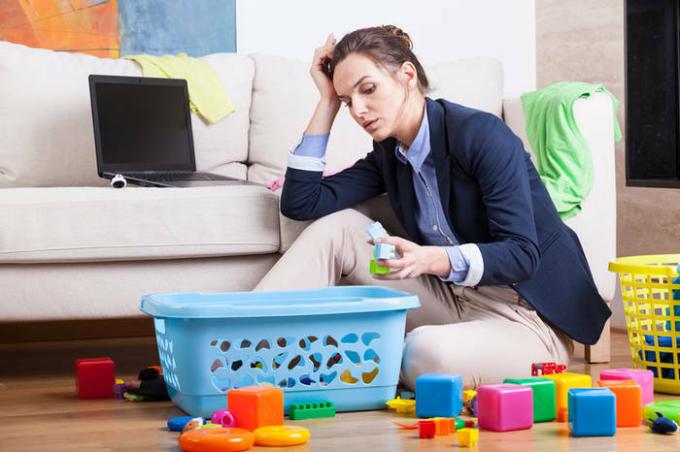The main mistakes of parents that can seriously damage the health and psyche of the child. What should not be allowed in the upbringing of modern children
We all want to be caring parents, give our children the maximum and keep up with the times in upbringing. There are many complexities along the way, and we often make mistakes with the best of intentions. Especially now, when there are so many conflicting advice: grandmothers repeat one thing from their own experience, and the books of smart psychologists say another. Indeed, today we have a new generation running around the house, and the old rules and approaches in many ways no longer work. However, the desire to be advanced parents can play a cruel joke. We have collected TOP-5 common mistakes of modern education that can seriously harm the health and psyche of our children.
Error 1. The child can eat what he wants

Parents are always in control when it comes to food / istockphoto.com
One of the main approaches of modern parenting is not to force the child to do what he does not like. We are taught to listen to our children, to respect their opinions and not to put pressure on parental authority. There are a lot of good things about this position, and it really helps shape your personality. However, it happens that parents have "excesses".
So, for example, in the matter of food, you can often find a picture: a child refuses soup and demands porridge. The porridge is cooked, but the kid already wants cutlets. Mom rushes about the kitchen in search of what her child will like, and the child at this time seizes hunger with a cookie. Or another moment: the child was poking around in the plate and got up from the table with the words "ate". Psychologists in such a situation advise not to force the baby to finish eating, so that he himself learns to control the feeling of satiety. It's great if you can withstand the iron line of behavior and after an hour (when he comes running hungry) put the same dish on the table in front of him. However, as a rule, the mother gives up and allows the baby to have a tasty snack until the next meal.
Eating habits and proper eating behavior must be formed from childhood. If you allow the child to eat what he wants, and as much as he wants, his diet will consist of dumplings, pasta with sausages, lemonade and sweets. This "diet" will lead to stomach problems and weight gain. Therefore, permissiveness in matters of food is definitely unacceptable.
Mistake 2. The child can sleep when he wants

You need to go to bed on schedule / istockphoto.com
Another "bias" in upbringing is the lack of a clear daily routine in the child. It is now very fashionable not to put babies on schedule. Parents of infants are advised to sleep "on demand" when the child is tired, rubs his eyes or starts to act up. For children under one year old, this makes a certain sense: if such a baby is "overexposed", not letting him sleep until a certain time, he will be overexcited, and eventually.laying down will turn into a real nightmare
The older the child gets, the more reason there is to train him to sleep on schedule. Firstly, such a regime will be in kindergarten, and if your baby is used to chaotic falling asleep (he may fall asleep twice a day, or may not sleep at all during the day), it will be quite difficult for him. Second, sleep is incredibly important at school age. If before this time you do not adjust the "internal clock" of the child and teach him to go to bed at a certain time, problems may begin. Obviously, the child himself will not express the desire to go to bed at 9 pm, when the parents are still watching a movie or drinking tea in the kitchen. However, “hanging out” until 11 and falling asleep together is not an option. Such a schedule will lead to chronic lack of sleep, and this will affect the health and children's psyche.
Mistake 3. Gadgets are useful for the modern child

There should be fewer gadgets in a child's life / istockphoto.com
The global problem of our time is the interaction of children with gadgets. Prohibit or allow a child a TV, smartphone, tablet, smart watch with built-in games and all the other interactive delights of progress? On the one hand, the total ban on gadgets in a child's life looks rather strange: now it is an integral part of any person's life. Gadgets are used not only for entertainment; they are indispensable in work and even in studies. Sometimes they can really be useful for children: for example, there are many high-quality educational applications and games that teach children to count, read and even write.
Nevertheless, here too, parents should not go too far. The temptation is great, and often we give the child a gadget when we need to keep him busy (for example, when we work at home, come to visit, or ride on public transport). This is a big mistake: do not constantly offer children "chewing gum for the brain", otherwise they will not learn to occupy themselves independently. Scientists have proven that the constant presence of gadgets in a child's life (especially at an early age) inhibits his emotional and social development. At an older age, there may be problems with self-control, sensorimotor development and perception of information.
Error 4. The child needs to be occupied all the time

No need to keep your child busy / istockphoto.com
Nowadays there is a lot of talk about the need to spend quality free time. Read useful books, sign up for courses and a gym, take trainings on self-development and personal growth. Many parents not only pick up this trend themselves, but also try to apply it to their children. From an early age, today's children have at least three sections or circles in their schedule - English, dancing or football, swimming, programming, yoga. It often happens that the week is scheduled by the hour, and the child simply does not have enough time to be alone with by yourself, play with toys, draw or lie on the couch without being in a hurry.
This dynamic is often exhausting for an adult, not to mention children, who have a completely different perception of the world. For them, a big puddle on the way to English is often more important and interesting than English itself. Even very delicately imposing useful activities on the child, we "replace" his true desires and values. In addition, running from circle to circle, children sooner or later forget how to occupy themselves. Already at an older age, left at home alone, they cannot apply themselves to any business, they do not want anything. From here, depressive conditions begin, which, according to the latest data, have become more frequent in children under 13 years of age.
Error 5. The child always needs to come to the rescue

Don't make your child's work / istockphoto.com
Psychologists say: in order for a child to grow into a strong and self-confident person, he needs to feel the love and support of his parents behind his back from early childhood. This works if you do not bring the situation to the point of absurdity. We rush to the baby, if he falls, we grab him on the arms and immediately begin to calm him down. We run to the rescue on the first "ma", blow out our nose, lace up our shoes, put together a puzzle that does not add up, and solve a problem that cannot be solved. As a result, the child grows up in the firm belief that there is someone who will always solve all problems for him. Such infantilism often turns into adulthood, and already a thirty-year-old girl calls her mother with a request to call a plumber to fix a broken tap.
The main task of parents at all times and epochs is to be near the child, but not instead of him. We must allow the child to face the difficulties of solving the problem on their own. In early childhood, these are laces and a designer, at school age - tasks and conflicts with classmates. Ideally, in the process of upbringing, an absolutely independent person should grow up who will confidently fly out of the nest to wings, and will feel the need for parents not for solving everyday problems, but for warmth and emotional support.
You will also be interested to read:
5 types of parenting that cripple a child's life
5 parenting secrets from Japanese moms: learning from experience
What to do if mom and dad have different views on parenting: advice from a psychologist

